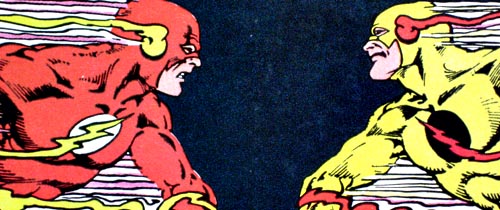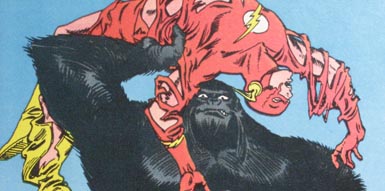Welcome to the second part of our interview with legendary Flash writer Cary Bates! A DC Comics luminary, Bates’ first Flash story appeared in 1968, and he was the regular writer on the book from 1971 – 1985.
Last week we discussed the genesis and impact of the Death of Iris Allen story arc, which we have also been annotating here at the site. This week we’ll look at the implications of that story and the final days of the Flash title, as well as Bates’ upcoming work for DC Comics, both Flash and otherwise.
Q: Did you know, when the Death of Iris arc came to a close, that you would be revisiting Prof. Zoom and the murder four years down the road? In the intervening years, there is a clear separation of Barry from that incident and his past life, but eventually it all comes back with a vengeance. When read at once, it feels like the tension from Iris’ murder and the fate of Zoom is hanging over Flash throughout those years, and comes crashing down in the Trial.
Cary Bates: You’re right, for a couple of years back then the prime engine of the book was Barry moving on after the Iris chapter of his life had come to an end. I can’t remember exactly when the idea of Zoom resurfacing occurred to me, but I do recall his return was always directly linked with Barry’s impending marriage to Fiona. I found something perversely irresistible about Zoom becoming obsessed with making history repeat itself by robbing his arch-foe of his second wife just as he had killed Iris. And of course, it became the catalyst for Flash killing Zoom in order to protect his new bride. Even though he acted in self-defense in the heat of the moment, the notion of a high-profile super-hero committing manslaughter for real (let alone being charged with murder) was quite a radical departure for a mainstream DC book in that era.
Q: If not for the advent of Crisis on Infinite Earths, what direction would you have taken the Flash title after the Trial story? Would the resolution have been much different than what was published, and if so, did you have stories completed that were discarded?
CB: Because DC had given me over a year’s advance notice of the Crisis and Flash’s inevitable demise, I was focusing all my energies on the Trial storyline, since it would now carry through until the very end of the book’s run. So in all honesty I never contemplated what Flash’s life might have been like after the verdict. But the far more interesting question is what might have been had there been no Crisis event? Well, for one thing the Trial would’ve probably ended a good 8 or 9 issues earlier. Flash would’ve been vindicated and found not guilty in the court of public opinion—but perhaps not by the court system. In fact, before the Crisis entered into things, I do remember toying with the idea of Flash being found guilty and going “on the run” (literally). This would’ve kicked off a new story arc which would have had Flash continuing to do his good deeds as a wanted man with an arrest warrant hanging over his head (sort of a variation on the Green Hornet concept of a hero who the authorities view as a criminal). What I liked most about this idea was the delicious irony of a Flash who ends up joining his own Rogues Gallery.
Q: You returned to DC last year with The Last Family of Krypton, and you’re on tap to write a DC RetroActive issue of Flash, your first new Flash story since 1985. Can you tell us anything about the new story? Also, do you know which of your previous Flash stories will be reprinted in the issue?
CB: It’s titled “Son of Grodd” and it explores the concept of fatherhood on two parallel tracks, one dealing with Grodd and the other with Barry. It occurred to me that it was never revealed back in the day why Barry and Iris—who were very much in love and obviously had a very active sex life—remained childless throughout the Bronze Age. With this story, heretofore unspoken aspects of the Allen marriage will finally be explored in depth. At the same time, you’ll be seeing a new side of Grodd as we find out what kind of father he might have made back in the ‘70’s. It should be no surprise that Grodd’s foray into fatherhood will prove him to be a grotesquely warped, simian Daddy Dearest. Both these story threads are linked by an homage to the sort of Schwartz-driven “funky science” that often permeated the bronze age Flash, from the outlandish super-speed stunts to the byzantine schemes often perpetrated by the Rogues Gallery. (Suffice it to say the Grodd son introduced in this story bears no resemblance to the Gorbul Mammit offspring that showed up in the ‘90’s).
Q: Do you have any other projects in the works for DC at the moment?
CB: I’m currently writing a creator-owned maxi-series. Ian Sattler is the editor. Like me he’s a big fan of trend-setting cable shows like The Shield and Dexter, both of which pushed the limits of their respective genres… which is our goal with this series. It’s a dark take on some classic comic book myths that will deal with a group of brand new, deeply disturbing characters who will defy and redefine everything you thought you knew about the mentor-protégé relationships between super-heroes. An artist hasn’t been chosen yet so it’s not on the schedule yet, but hopefully you’ll be hearing more about the project later this summer.



This interview so far is really interesting and cool. I’m going to pick up the Showcase Presents Book the Trail of the Flash when it comes out. Reading this interview has me excited for his Retroactive special
I’m looking forward to the retro issue too (I always did wonder about the childless marriage thing). And its too bad we never got to see a guilty verdict turn Flash into a member of his own rogues gallery. Sweet!
Yep. Really looking forward to the retro issue now.
I also like the idea behind his creator owned project!
Thanks for the interview!!
Fantastic interview! Thanks!
It’ll be a real treat to have one more Cary Bates Flash issue to read!
A new Cary Bates Flash story? Man, sign me up! If we can get Bill Messner-Loebs to do one after that, the return of my childhood will be complete.
Another great interview, Greg!
As much as I’m glad I had the chance to read so many years of Wally West stories, it would have been really interesting to read both a tighter Trial storyline and the Flash on the run. Of course, since I was just getting into comics at the time, and picked up The Flash on the strength of the Titans connection, I might not have gotten into it in the first place, so who knows?
And Zeke, you’re in luck. Check out the August solicitations!
Another fantastic interview Greg.
Pingback: Okay, fine, it’s Abra Kadabra.